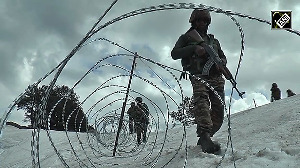 Pakistan's powerful spy agency Inter-Services Intelligence sought to intercept all communications passing through the country in 2013, the most significant expansion of its capacity to conduct mass surveillance to date and rivalling that of the United States and UK, according to a new report that could have implications for India.
Pakistan's powerful spy agency Inter-Services Intelligence sought to intercept all communications passing through the country in 2013, the most significant expansion of its capacity to conduct mass surveillance to date and rivalling that of the United States and UK, according to a new report that could have implications for India.
In June 2013, the ISI, Pakistan's best known intelligence agency, sought to develop a mass surveillance system by directly tapping the main fibre optic cables entering Pakistan that carried most of the nation's network communication data, Privacy International said.
"This system would make available virtually all of the nation's domestic and international communications data for scrutiny, the most significant expansion of the government's capacity to conduct mass surveillance to date," it said in a report titled, "Tipping the Scales: Surveillance and security in Pakistan".
The project is the first Pakistani government-run centralised mass surveillance project to be publicly revealed, the report released by the UK-based charity that defends and promotes the right to privacy across the world, said.
The total intake of data every second sought by Pakistan in the proposal document would rival some of the world's most powerful surveillance programmes, including the UK's 'Tempora' and US' 'Upstream' programmes.
What the ISI wanted to build, according to the request for proposals, was a complete surveillance system that would capture mobile communications data, including Wi-Fi, all broadband internet traffic, and any data transmitted over 3G.
According to the documents, the interception activities were to be "seamless" and "must not be detectable or visible to the subscriber".
Since the creation of the Pakistan Internet Exchange -- a communications system that keeps most of Pakistan's communications within Pakistan -- the government has been able to route the majority of Pakistan's internet traffic through a single core backbone with limited gateways, making it much easier to monitor internet traffic, the report said.
Voice over Internet Protocol communications, including popular services such as Skype and Viber, are also heavily monitored, the report said.
In a secret request for proposals from 2013, the ISI called for complete surveillance system to monitor "[a]ll international IP [internet protocol] traffic....at 3 landing and 2 x Satellite IPLCs [International Private Leased Circuits] sites...."
The ISI explicitly requested the system to be scalable to meet future expansion plans of the network operators it sought to tap, Privacy International said in a release.
Pakistan's sizeable population of over 180 million generates huge amounts of communications traffic. Interception across these networks has expanded over the past decade, thanks primarily to private foreign surveillance technology companies.
Firms from countries including China, Finland, France, Germany, Sweden, and the United States have provided critical interception equipment for Pakistan's communication networks,pursuant to licensing requirements that require the networks to be lawful interception-compliant, the report said.
Commenting on the report, Eric King, Deputy Director, Privacy International, said: "Mass, indiscriminate surveillance goes against the most basic fundamental human right to privacy.
"The scope and scale of the programme that the ISI wanted to build in 2013, which would monitor the entire scope of IP- bound communications passing in and through Pakistan, is neither necessary nor proportionate. We also have major concerns about the ISI's track record of engaging in extra-judicial arrests and other abuses," King said.
Matthew Rice, Advocacy Officer, Privacy International, said: "This new report is a revelation in understanding the operation of surveillance in Pakistan and the grand ideas held by its government."
Pakistan's intelligence agencies are not grounded in legislation, it is unclear who has the power to oversee their actions or evaluate proposed projects. This proposal document should act as a wake up call to Members of the National Assembly in Pakistan of what is being done in the name of the people of Pakistan," Rice said.
"The scale of the system proposed by the ISI does not just affect those who live in Pakistan but also those who live in the region and anyone whose communications travel through Pakistan's networks. This will include a huge amount of innocent people swept up in a project like this for no good reason," Rice said.
"We need to know whether this project was approved, and if so how it is being regulated to prevent abuse of such a powerful system. The Pakistan government should not just be accounting to the Pakistan people but the international community at large about how, if the project was approved and built, the current legislative framework in Pakistan continues to guarantee everyones fundamental rights," Rice said.






 © 2025
© 2025